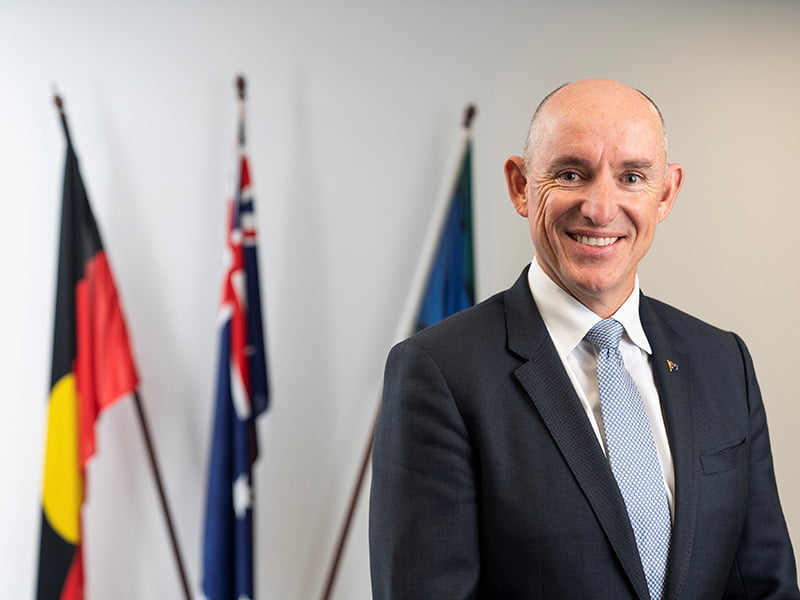The Digital Transformation Agency has a whole-of-government approach to data and digital policies in its new home in PM&C, employment minister Stuart Robert says.
Despite his new role in the employment portfolio, Mr Robert has retained control of the Digital Transformation Agency (DTA) and will be the “whole-of-government minister with responsibility” for the government’s data and digital agenda.
In a speech at the Australian Financial Review Government Summit, Mr Robert outlined the DTA’s new structure and mandate, and provided a series of updates on a number of government digital policies, including digital identity and myGov.

Earlier this month the DTA was moved from Services Australia to the Department of Prime Minister & Cabinet, where it was previously located, under the control of Mr Robert.
This move came with an updated mandate, Mr Robert said, with a focus on a whole-of-government approach to tech policies and digital transformation.
“We are now taking a whole-of-government and, where appropriate, a whole-of-nation approach to building scalable, secure and resilient data and digital capabilities that will not only deliver for Australia in a customer sense, but give us competitive advantage as a country and as an economy,” Mr Robert said in the speech.
This will involve the DTA working across portfolios, departments and agencies, and with state and territory governments, Mr Robert said.
“The problems we face currently as a nation – whether it is economic recovery from COVID and creating more jobs, protecting our health and the vulnerable, or defending our national interests – require that we interact across all portfolios and tiers of government,” he said.
“Government must operate as a consistent platform that brings together stakeholders, systems, processes and data to solve the challenges ahead of us. This is the only way to deliver the alignment we need, to be on the same pages with all Australians, to develop the right policies and deliver the right services.”
The DTA has also already covered many whole-of-government IT policies and strategies, including large deals with tech providers such as IBM.
The agency’s mandate now includes responsibility for whole-of-government ICT governance, strategy, policy, architecture, processes and procedures.
The DTA is currently developing a whole-of-government architecture to map out the existing capabilities of government and gaps that need to be addressed.
This strategy will take into account the age and complexity of existing government systems to get a “complete picture of what we have, what we need, what we must invest and by when”, Mr Robert said.
In the speech, the Minister also announced that three cyber hub pilots will be establish allowing large agencies such as Home Affairs and Services Australia to provide cybersecurity services for small agencies that “cannot match their breadth and depth of skills”.
“We can see a future where such hub models may be established for other types of scalable services, not just cybersecurity,” Mr Robert said.
Mr Robert flagged changes to address “long and complex” government procurement processes which only serve the “specialised industry that has been built around them”.
“Government often finds itself with investment proposals that are presented as urgent or critical, but with limited opportunity to consider the broader strategic context of those proposals,” he said.
“Such practices cost government and providers a lot of money, use precious time that can be more productively put towards implementation and artificially restrict the available providers to those that can afford the high costs and long timeframes involved.
“As a result, the government may be missing out on significant innovation from segments of the market, including Australian providers, who may find it easier and faster to engage with private sector customers, rather than go through the long procurement cycles in government.”
The Commonwealth’s federated digital identity program is now a “high priority” across government, with Mr Robert revealing that Eftpos has recently applied to have its digital identity service accredited under the scheme, the first private sector organisation to do so.
He also said that a further round of consultation on legislation underpinning the digital ID scheme will open soon.
Mr Robert also drew attention to the ongoing redevelopment of myGov, with a beta site launched several months ago.
Do you know more? Contact James Riley via Email.


Hey ! Great news. The DTA is going global. So please show me something they have done so far. Is there anything they have done and finished, like completed ? Isn’t this Beta Universe ? Always going to finish this sometime in the future ? More money please. More money for fear ? It’s cyber security ? Be afraid, always afraid. Really but, the DTA has only ever been about 2 things: the Australian Barcode and the government cheque book. That’s a unique code on you from birth to death and control over the +10 billion dollar IT spend, to make sure it ends up in the right pockets. Nothing to do with long procurement cycles. Talk Australian SME then pay large foreign / consultant /no-bid mate. Nothing to see here guys. Thanks Stu. Love your work.